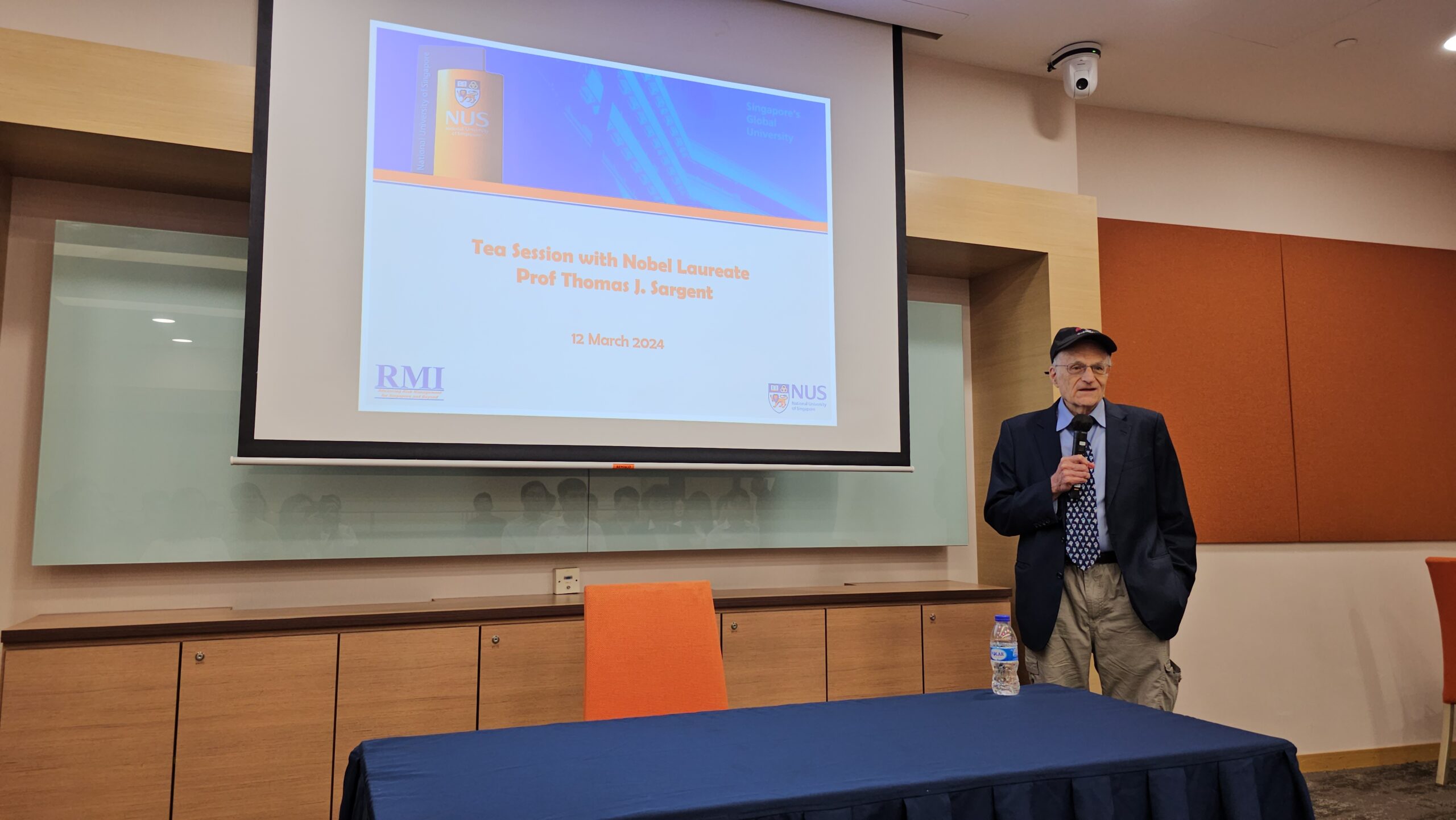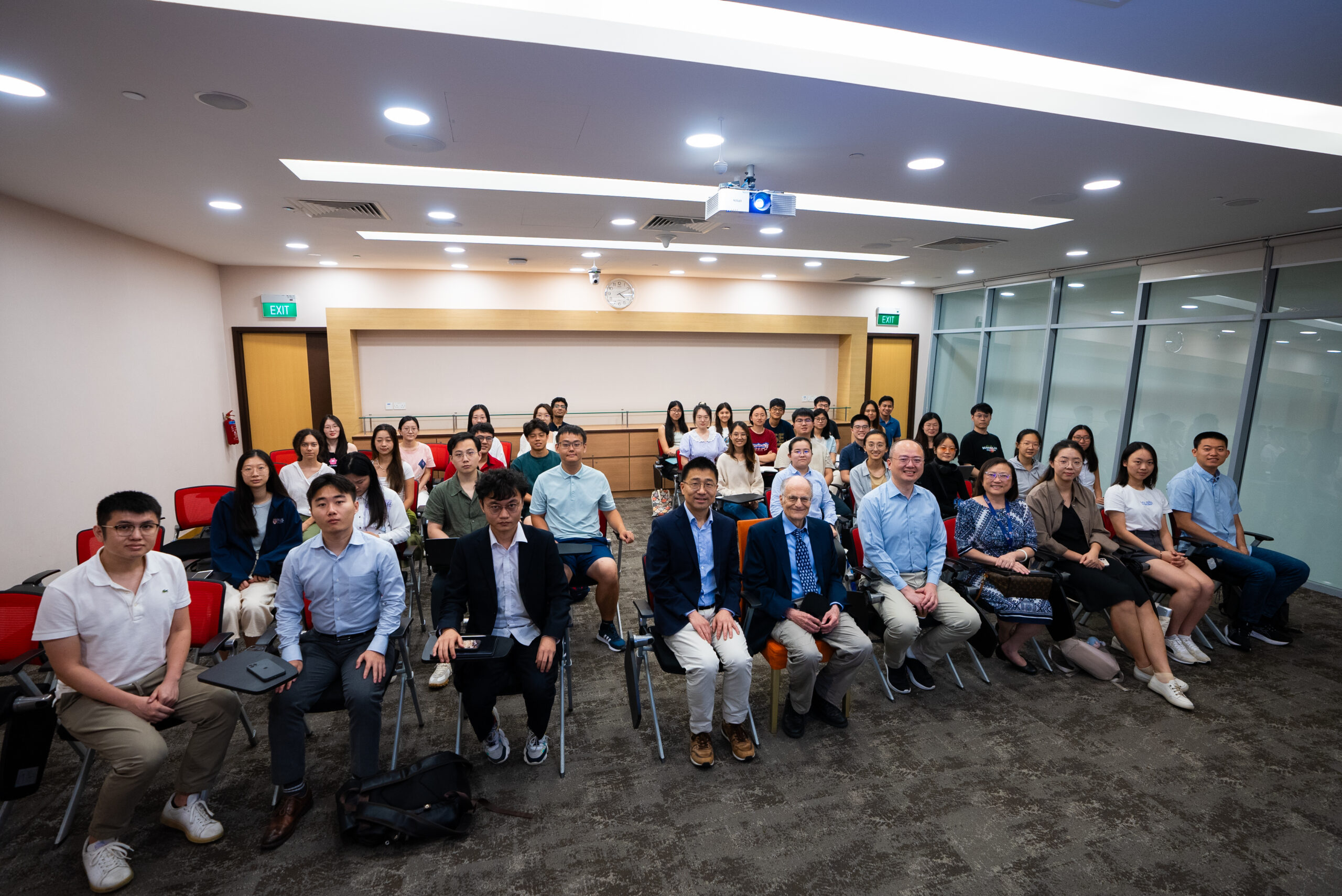Learning with a Nobel Laureate
April 29, 2024
A group of NUS students had the exceptional opportunity to interact with, and learn from Nobel Laureate in Economics Professor Thomas J. SARGENT, one of today’s most influential economists, when he was jointly invited to Singapore by NUS’ Faculty of Science, Faculty of Arts and Social Sciences and the Risk Management Institute (RMI) recently to teach the course FE5213 Quantitative Macroeconomics and Finance with Python.
This course was specifically designed by Prof Sargent for students from the undergraduate Cross-Disciplinary Programme in Data Science and Economics (DSE) and the MSc in Financial Engineering (MFE).
Prof Sargent was awarded the Nobel Memorial Prize in Economic Sciences in 2011 together with Christopher A Sims for their empirical research on the causal relationship between economic policy and different macroeconomic variables such as GDP, inflation, employment and investments.
From his rich experiences teaching at several leading universities, including the University of Chicago, Stanford University and New York University, Prof Sargent believes that teachers learn together with their students. Recognising that students and teachers are in pursuit of the same goals has been “liberating and enlightening,” he once said. Indeed, on many occasions, he has been inspired to learn by his students who acquired knowledge on new things before he did. With this course, which Prof Sargent will continue to teach over the next two years, our students will benefit from his wisdom, clarity of thought and rigorous approach to economic analysis.

Year 3 DSE student LUO Xinming, who attended Prof Sargent’s class, said, “His teaching is different from typical classroom teaching which is guided by a fixed outline. Prof Sargent dives deep into the problem. Beyond sharing or going through theory, he prompts us to think about what inspires the theory and encourages us to seek to discover the unknown. That is the biggest inspiration for me.”

During the course, which ran from 6 February to 19 March 2024, students embarked on a comprehensive journey through the fundamentals of macroeconomic analysis, starting with Present Value, a fundamental concept for asset pricing theory. As the class progressed, Prof Sargent intricately weaved in more complex models into the curriculum, such as the Consumption-Smoothing Model, which delves into optimising consumption over time for maximising utility, and the Equalising Difference Model, a key framework for analysing labour market decisions and wage differentials. He also guided students on an exploration of the history of modern macroeconomics dating back to giants like Milton Friedman.

While ensuring that students grasped the theoretical underpinnings of each concept, Prof Sargent also took the lead and encouraged students to implement the models in Python. His focus on hands-on Python coding, with the assistance of teaching assistant ZHENG Zhongxi, an Economics PhD student at NUS, enhanced the students’ analytical capabilities, enabling them to apply both technical skills and theories to simulate and visualise the results in different real-world scenarios. For example, as part of their final assessments, students were asked to use Python to solve a career choice problem by computing and comparing income streams that an individual could possibly obtain throughout his/her lifetime.
Year 3 DSE student Kelly WANG said, “I benefited from Prof Sargent’s teaching by learning different macroeconomic models which are very relevant to economics and finance and which offer new perspectives in asset pricing theory. More importantly, I learned how to implement these models in Python, which could be very useful and powerful for real-life applications.”
An in-depth study of asset pricing using Markov Chains, a concept with wide-ranging applications in forecasting future scenarios based on present probabilities, was one of the key highlights of the course. With this tool, Prof Sargent brought students to the forefront of macroeconomics by discussing how to incorporate beliefs using Markov Chains and showing how asset pricing models with heterogeneous beliefs could be powerful means to understand phenomena in the financial market, such as asset bubbles.
MFE graduate student DENG Zhuoying, said, “Understanding the methodology behind direct and inverse problems deepens my appreciation of complex econometrics models. Prof Sargent combines hands-on laboratory sessions and in-class quizzes – the blending of practice with theory is challenging but rewarding as I have to apply what I learn in real time.”


During his visit, Prof Sargent also gave a guest lecture at the 2024 Advanced Workshop for Central Bankers jointly organised by the Center for International Macroeconomics (CIM) at Northwestern University and RMI, in collaboration with the Monetary Authority of Singapore. He also visited the Lee Kuan Yew School of Public Policy and attended an in-person macroeconomics workshop which RMI organised in his honour.
The genesis for FE5213 stemmed from an engagement last year between Professor SUN Yeneng, Dean of Science and Chairman of the RMI Management Board, and Prof Sargent, when Prof Sun discovered his passion in teaching. Subsequently, RMI worked with Prof Sargent to develop the course curriculum.
Prof Sun said, “It is remarkable that Prof Sargent, a world renowned scholar, remains passionate in teaching both undergraduate and postgraduate students. He is truly a role model for us all.”

